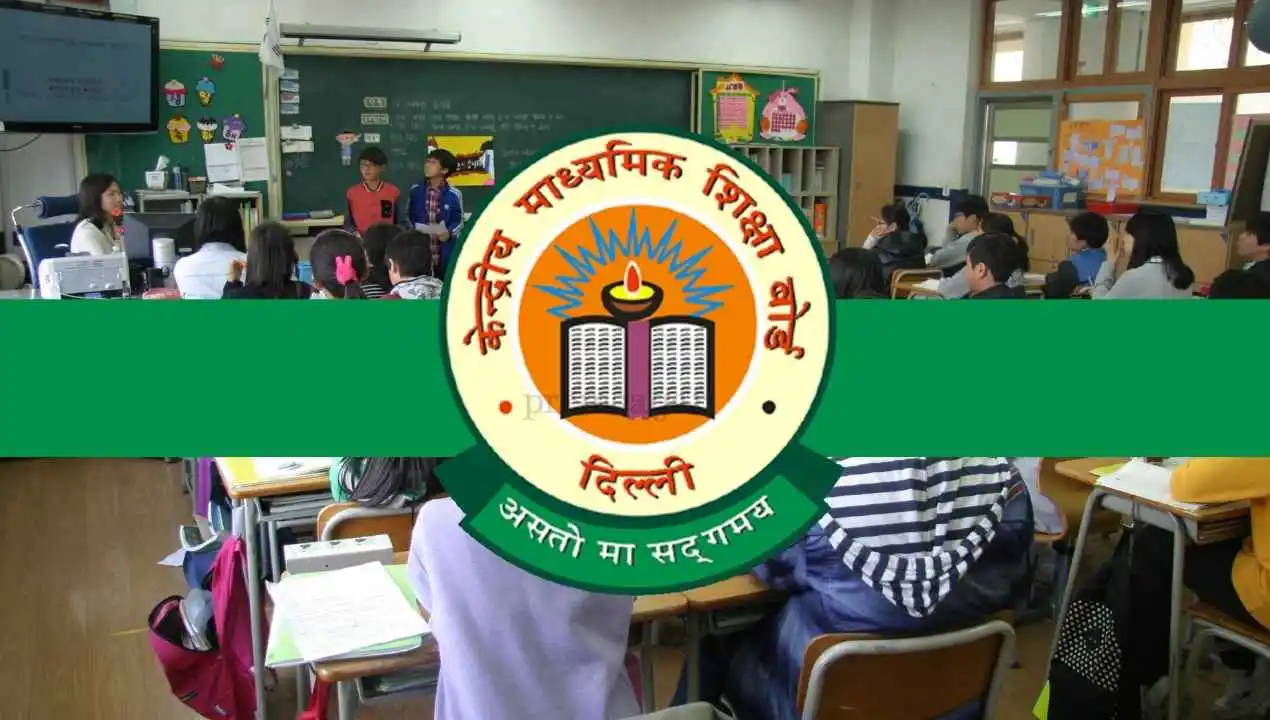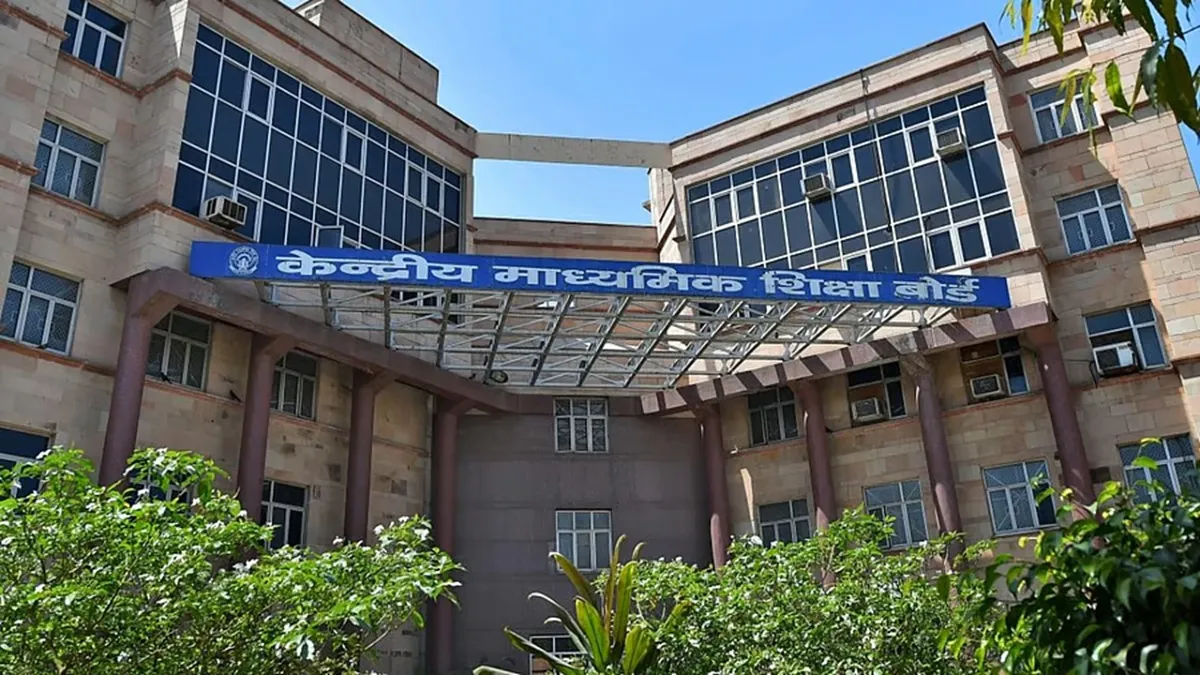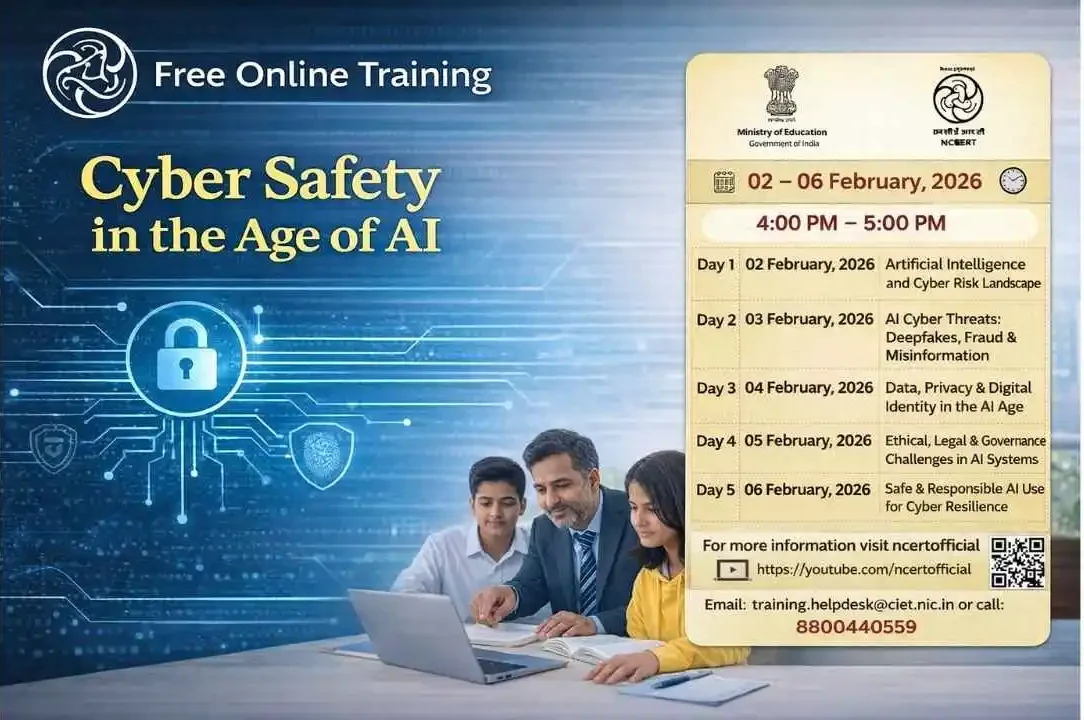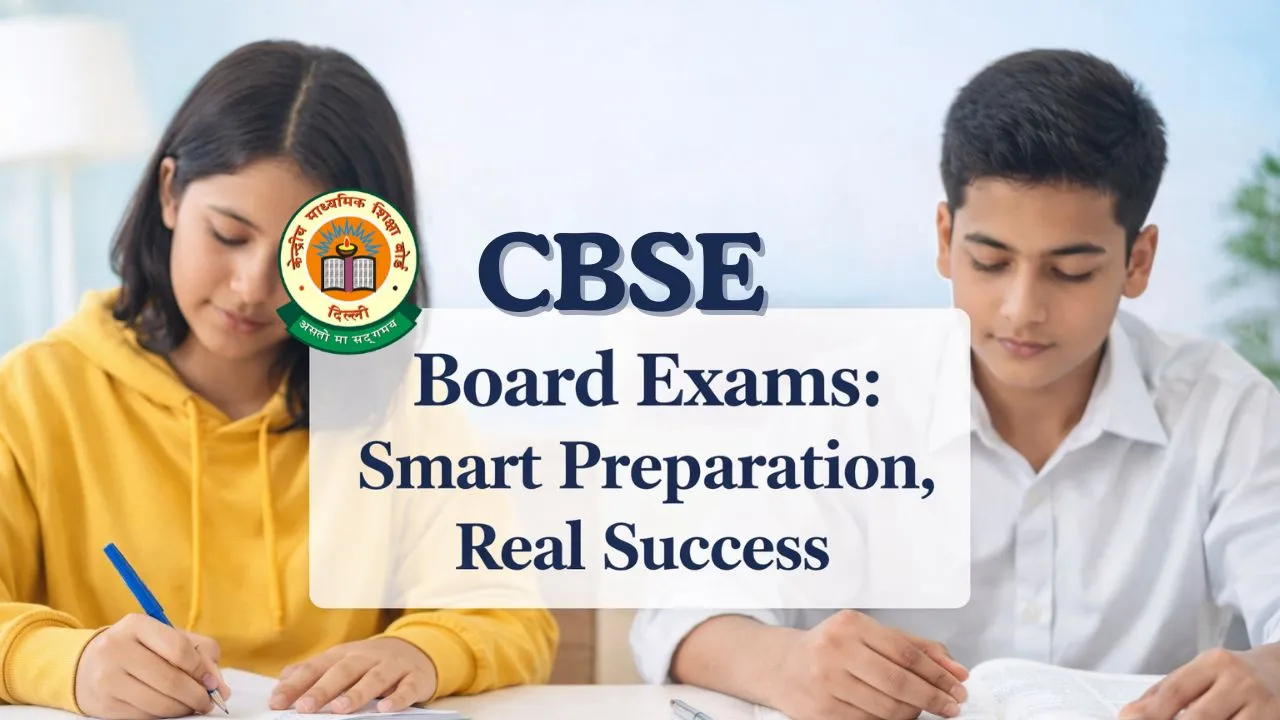CBSE Explains New Two-Board Exam System for Class 10: Teachers and Students Must Know These Key Rules
PORTION 1 — Opening, Context & Policy Rationale
The webinar opened with a formal welcome to CBSE leaders, heads of educational societies, school principals, and thousands of online participants. The organisers emphasised that the session was meant to clarify persistent doubts about the newly introduced Two Board Examination Policy for Class X, which will be implemented from 2026.
Speakers stressed that this is one of the most significant reforms in recent years and requires clear understanding, coordination, and uniform implementation across all CBSE schools.
A Landmark Shift in India’s Assessment System
The CBSE Chairperson explained that the decision to hold two board exams in an academic year arises directly from the National Education Policy (NEP) 2020. One of NEP’s core aims is to reduce the high-stakes pressure traditionally associated with board exams.
Many students experience excessive anxiety because a single exam attempt determines their academic outcome. The new system intends to offer flexibility and multiple opportunities without diluting academic seriousness.
Key Points of CBSE Class 10 Two-Board Exam System (2025–26)
| Topic / Question | Clear Explanation (Full Lines for Easy Understanding) |
|---|---|
| What is the new two-board-exam system? | CBSE will now conduct two Class 10 board exams in the same academic year. The first exam (Feb–Mar) is compulsory for all students. The second exam (May–June) is optional and is meant for improvement or students who missed the first exam for valid reasons. The best score out of the two will be counted as the final result. |
| Why has CBSE introduced two exams? | The new system aims to reduce pressure, give students a second chance within the same year, and remove the stress of a “one-time final exam.” |
| Eligibility for second exam | Only subjects with 50% or more external assessment are eligible for the second exam. Students can improve in maximum three subjects. Those missing the first exam in three or more subjects will be marked as Essential Repeat and cannot appear in the second exam. |
| How many subjects can be improved? | Improvement is allowed in up to three subjects only. Students should strategically decide which subjects need reattempt based on marks and difficulty. |
| What happens if a student fails the first board exam? | Students failing in one or two subjects can reappear during the second exam as improvement/compartment. Students failing in three or more subjects will be placed under Essential Repeat and must repeat the year. |
| Result and evaluation timelines | The first exam results will be declared by April. The second exam results will likely be released by June. Evaluation for the second attempt will be faster due to fewer students appearing. |
| Will the syllabus be reduced for attempt 2? | No. Both exams will follow the same full syllabus, same question paper pattern, same difficulty level, and same assessment structure. There is no syllabus relaxation for the second attempt. |
| Should students treat the first exam seriously? | Yes. CBSE has repeatedly stated that the first exam is the main attempt. Students should complete their preparation early and aim to score well in the first attempt. The second attempt should be used only when necessary. |
| How should students plan preparation? | Students must finish the syllabus early, revise thoroughly, and attempt the first exam with full confidence. After the first result, they should identify if improvement is needed in specific subjects and attempt the second exam strategically. |
| What did the CBSE Chairman clarify in the webinar? | The Chairman clearly stated that the second exam is not for splitting subjects or as a replacement for the first exam. Only subjects with 50% external assessment qualify. Only around 40% of students may appear for the improvement exam. Students missing three subjects cannot sit for the second exam. |
| Main takeaways for students and parents | The first exam is compulsory; the second exam is optional. Both exams have the same syllabus. Students failing 1–2 subjects can clear them in attempt 2. Students failing or missing 3+ subjects repeat the year. Parents must help students in planning early and remaining consistent. |
| Overall summary of the new system | The new dual-exam system gives students relief from high pressure, offers flexibility for improvement, keeps academic standards high, and allows better academic planning within the same year. The system encourages smart preparation and strategic use of the second attempt. |
Why Two Board Exams? The Conceptual Reasoning
The Joint Secretary outlined the reasoning behind the reform:
- Students are under immense pressure because board exams function as “one-shot” assessments.
- NEP recommended multiple chances so students who wish to improve their performance may do so.
- Two exams help shift the system toward competency-based learning rather than rote memorisation.
- The goal is not to make exams casual but to reduce fear while maintaining rigour.
Although multiple options were considered—such as a semester system or “anytime exams”—CBSE chose a structured main exam + improvement exam model because it is practical, fair, and logistically manageable.
Why Semester System or Anytime Exams Were Not Adopted
The Chairperson clarified that other models were rejected because:
- A semester system would overload teachers and evaluation teams with continuous high-volume assessments.
- Anytime exams require heavy proctoring infrastructure, advanced technology, and huge pools of question papers, making it highly impractical for a national-scale board.
- Both alternatives risk increasing stress rather than reducing it. Thus, the two-exam model was considered the best balance between flexibility and feasibility.
Structure of the Two-Exam System
CBSE explained the core operational principles:
- First exam is the main exam.
Students must appear seriously; schools cannot encourage skipping. Appearing casually or being absent in 3 or more subjects will result in losing the second-exam opportunity. - Second exam is only for improvement, not for appearing fresh in all subjects.
- Only subjects with >50% external assessment will be offered for improvement (e.g., Science, Maths, Social Science, main languages). Subjects with heavy internal assessment will not be repeated.
- Students can appear for maximum three subjects in the second exam.
- Internal assessments will not be repeated; only theory exams will be allowed again.
These rules aim to prevent misuse of the improvement window and ensure seriousness of the main exam.
Why Absence Rules Are Strict
If a student is absent in three or more subjects in the first exam (no matter the reason), they will be treated as having failed and cannot apply for the second exam that year. They must reappear the following year. This rule ensures that the first exam remains academically important and discourages strategic absenteeism.
Registration Window After First Exam
CBSE clarified that students will not choose their improvement subjects at the start of the year. Instead:
- After results of the first exam are declared, CBSE will open a 10–15 day window to apply for the second exam.
- This prevents unnecessary bulk registrations and reduces wastage of resources.
Scale of the Operation & Timelines
The Controller of Examinations presented the logistical scale:
- Four board exam cycles will run in the year (Class 10 main, Class 12 main, Second Exam, Supplementary).
- CBSE anticipates evaluating crores of answer sheets, although second exam load will be significantly smaller.
- The objective is to declare Class 10 results of the first exam by end of April, and second exam results by June 30, so schools can complete admissions on time.
Why Strict Timelines Matter
The overlapping nature of evaluation, centre management, logistics, and result processing means CBSE and schools must strictly follow deadlines. Any delay creates cascading problems across four exam cycles running in a tightly packed calendar.
PORTION 2 — Detailed Rules, Eligibility, Assessments & Categories
Eligibility Rules for Appearing in the Second Exam
CBSE clearly explained that the second exam is not a re-exam for everyone, but strictly an improvement opportunity within defined limits. The transcript highlights several key eligibility points:
- A student becomes eligible for the second exam only after appearing in the first exam for that subject.
- Students cannot skip the first exam and directly attempt the second one.
- If a candidate is absent in three or more subjects, they automatically lose the right to appear for the second exam. They must repeat the class or appear the following year.
- Students appear only in subjects where they wish to improve their marks, with a maximum cap of three subjects.
- Schools must make sure students understand that the first exam is mandatory and serious, not optional.
These rules were introduced to prevent misuse of the new system and maintain the seriousness of board examinations.
Which Subjects Are Allowed for Improvement? (Eligibility Based on Assessment Pattern)
CBSE clarified that not all subjects are eligible for the second exam. According to the transcript:
- Improvement will be allowed only for subjects where external theory assessment is more than 50%.
- Subjects with heavy internal components (such as art, vocational modules, and skill-based projects) will not be repeated.
- Internal Assessment (IA) marks from the first exam will be carried forward without any changes. No fresh IA will be allowed.
This helps control logistical load and ensures fairness, because repeating internal tasks would require fresh projects, oral tests, and practicals for lakhs of students.
Treatment of Internal Assessment, Projects & Practicals
The officials clearly stated:
- Internal Assessment marks will remain fixed for the entire academic year.
- Students cannot redo project work, practical tests, portfolios, or listening–speaking tasks.
- IA marks will be added to whichever theory score (first exam or second exam) is higher.
- In subjects where internal assessment constitutes more than 50%, the subject cannot be attempted again because practicals cannot be repeated.
This ensures consistency and avoids subjectivity or manipulation in repeated internal scoring.
Attendance Requirements & School Responsibilities
CBSE reiterated strict attendance rules:
- All students must maintain regular attendance in school to be eligible for both board exams.
- Schools must ensure proper record-keeping since attendance may be checked during verification or dispute resolution.
- Schools must not encourage students to intentionally skip the main exam in hopes of attempting the second one. Such attempts will be penalised through non-eligibility.
The transcript emphasises that schools must counsel parents and students early to avoid any misunderstanding of the new structure.
Special Provisions for CWSN (Children With Special Needs)
The Controller of Examinations explained that:
- All existing CWSN accommodations—such as scribes, extra time, relaxation in attendance, and exemption from certain subjects—will continue in both exam cycles.
- CWSN students may also appear in the second exam for improvement, following the same subject eligibility rules.
- No additional concessions have been added, but all current provisions remain fully applicable.
This ensures inclusivity and maintains uniformity across examination cycles.
Unfair Means (UFM) Rules Clearly Apply to Both Exams
CBSE highlighted that the Unfair Means (UFM) policy is unchanged:
- If any student is caught using unfair means in either exam, strict action will be taken.
- UFM cases in the second exam will be treated with the same seriousness as the first exam.
- Schools must brief students about prohibited items, behaviour standards, and examination conduct.
This prevents the misconception that second exams are “less strict.”
How Final Marks Will Be Determined
The transcript explains the marks computation process:
- For each subject, CBSE will compare marks from the first and second exam attempts.
- The higher score will be taken as the final score for that subject.
- The final marksheet will show only one set of marks, i.e., the best performance.
- There will be no mention of first attempt or second attempt on the final marksheet.
- If a student appears in the second exam for a subject but performs worse, CBSE will automatically retain the higher score from the first attempt.
This rule reinforces fairness and motivates genuine improvement.
Issue of Marksheet, Migration Certificate & Passing Documents
The Board clarified:
- A single final marksheet will be issued only after completion of both exam cycles.
- Students who appear only in the first exam and choose not to improve will receive their marksheet based on the first exam result.
- Migration certificates and other documents will be issued after results finalisation to prevent inconsistencies in record updates.
This ensures that students have clear, conflict-free documentation for admissions.
Revaluation, Photocopy of Answer Sheets, and Grievance Redressal
CBSE confirmed:
- Revaluation and photocopy services will be provided only for the first exam, due to tight timelines of the second exam.
- Grievance mechanisms remain unchanged.
- The focus is on timely completion of the entire exam cycle so students are not delayed in admissions for higher classes.
This maintains transparency while ensuring operational efficiency.
PORTION 3 — Centre Management, School Responsibilities & Final Takeaways
Centre Management and Exam Logistics Explained Clearly
CBSE officials devoted a full segment of the webinar to explain how the two-exam system will be managed smoothly across the country. The transcript describes the following points:
- CBSE will conduct both examination cycles with the same level of security, monitoring, and administrative discipline.
- Schools serving as examination centres must be ready for two full rounds of seating plans, invigilation duties, and confidential work.
- The second exam will not be a smaller or more informal exam; it will follow the same level of protocol as the first one.
- The Board will notify centres in advance so that schools can prepare staff and infrastructure for both cycles.
This clarity was provided to avoid confusion that the second exam is a minor or “lighter” attempt.
Expectations and Responsibilities of School Heads
The transcript highlights that principals carry a major responsibility in implementing the new exam system properly:
- Principals must guide students and parents so there is no misunderstanding about rules, eligibility, and timelines.
- Schools must ensure that students take the first exam seriously and do not intentionally skip it.
- Timely communication about the exam schedule, internal assessments, attendance, and form submissions is essential.
- Schools must support CBSE in logistical arrangements for both exam cycles, including invigilation, confidentiality, and coordination.
CBSE emphasised that principals have a crucial leadership role in ensuring the smooth and accurate execution of both examinations.
Guidelines for Teachers: What They Must Communicate to Students
Teachers are expected to:
- Explain the two-exam system clearly to avoid rumours and misinformation.
- Guide students on fulfilling subject eligibility rules correctly.
- Reassure them that improvement opportunities exist but only within the defined framework.
- Support students struggling with anxiety or confusion due to the new format.
- Ensure IA (Internal Assessment) tasks are completed on time because IA marks cannot be repeated in the second exam.
Teachers must act as the first line of guidance in helping students manage the new dual-exam structure.
Role of Parents in Supporting Students
The Board asked schools to keep parents informed because parental misunderstandings can cause confusion. According to the transcript:
- Parents should encourage students to attempt the first exam with full preparation.
- They must not pressure students to skip exams or misuse the improvement opportunity.
- Parents need to understand attendance rules and ensure their child maintains regular academic discipline.
Schools should organise orientation meetings or send notices so that parents remain aligned with CBSE guidelines.
Operational Roadmap for Schools
The CBSE officials outlined the operational flow for implementing the two-exam system:
- Both exam cycles will be conducted within the same academic session.
- Results of the first exam will be processed quickly so that students can decide whether they need the improvement exam.
- The timeline between the two exams will be short but manageable.
- The final marksheet will be prepared only after both cycles conclude or after the student opts out of the second exam.
- Schools must maintain accurate records of IA marks, attendance, and exam eligibility.
This roadmap ensures that the academic year progresses smoothly without disruption to admissions into Class XI.
Clear Instructions on Communication and Transparency
CBSE instructed schools to maintain transparency at every level:
- No student should think the second exam is a backup for lack of preparation.
- Schools must correct all misinformation being circulated on social media.
- Only information officially released by CBSE should be shared to avoid confusion.
- Schools must resolve student queries using the circulars, FAQs, and webinar clarifications.
This helps protect academic integrity and prevents misinterpretation of the new system.
Common Misconceptions Clarified in the Webinar
The transcript reveals that officials repeatedly clarified:
- The second exam is not a “compartment exam” — it is an improvement exam.
- It is not mandatory for everyone; only eligible students may appear.
- No new pattern or new syllabus applies between the first and second exam.
- Students cannot take the second exam in all subjects — only up to three, and only those allowed based on assessment structure.
- The first exam must be attempted; absence without valid reason may lead to ineligibility.
These clarifications were repeated because CBSE observed high levels of confusion among stakeholders.
Final Key Messages from CBSE Officials
The closing part of the webinar summarised the Board’s vision:
- The two-exam structure is designed to reduce stress and help students improve their performance.
- The success of this reform depends on the coordinated efforts of principals, teachers, parents, and students.
- CBSE assured that all necessary circulars, timelines, and guidelines will continue to be issued for clarity.
- Schools must read each circular carefully and check the CBSE website regularly.
- The Board expressed confidence that the new system will strengthen assessment quality and benefit students across the country.
The session ended with a request for disciplined cooperation from all schools.
Disclaimer
This news article is created strictly based on the official CBSE webinar transcript and circulars available at the time of writing. No additional interpretation or external information has been added. Readers are advised to rely only on official CBSE sources for final decisions.
If you have any doubt, confusion, or want complete clarity, please watch the original CBSE Webinar video, as it provides direct explanations from CBSE officials.
Five Most Important FAQs (Single-Line Answers)
Q. What did CBSE announce in the webinar?
CBSE explained how the new two-board examination system for Class 10 will work from 2025 onwards.
Q. Why is CBSE introducing two board exams?
To reduce stress, increase flexibility, and allow students more chances to improve performance.
Q. Will both exams be compulsory for students?
Yes, students must appear in both exams, but the best score will be considered.
Q. What must schools prepare for under the new system?
Schools must align teaching plans, assessments, and academic calendars with the new exam structure.
Q. Where can schools find the official details?
All instructions are available through the latest CBSE webinar briefing and circular posted on cbse.gov.in.
Q. What is the main purpose of introducing two board examinations for Class 10?
The system aims to reduce exam pressure, give students a second attempt within the same academic year, and support NEP 2020 reforms that promote flexibility and stress-free learning.
Q. Which subjects are eligible for appearing in the second board examination?
Only subjects with more than 50% external assessment, such as Science, Mathematics, Social Science, and Languages, are eligible.
Q. How many subjects can a student appear for in the second board examination for improvement?
A maximum of three subjects can be taken for improvement.
Q. Can a student who is absent in three or more subjects in the first exam appear for the second exam?
No. Such students will be placed in the Essential Repeat category and must repeat the year.
Q. Is the syllabus the same for both attempts?
Yes. Both exams follow the same full syllabus, pattern, and difficulty level.
Q. Can internal assessment marks be improved in the second attempt?
No. Internal assessment marks are fixed and cannot be changed.
Q. When will results be announced?
First exam results will be declared in April, and second exam results will be declared in June.
Q. How can students apply for the second exam after the first results?
Students must register during the short application window announced after the first exam results.
Q. Can students strategically choose different subjects for the two exams?
No. Students must appear for all subjects in the first exam. The second exam is only for improvement or absentees.
Q. What is the attendance requirement for board exam eligibility?
Students must have at least 75% attendance.
Q. How will final marks be calculated if a student appears in both exams?
The best score of the two attempts for each subject will be considered as the final result.
Q. What if a student moves to another city between the two exams?
Students can appear from another exam centre after completing the transfer procedure.
Q. Are students participating in national or international sports allowed to take the second exam?
Yes, with proper documentation.
Q. Can students change subjects between the first and second exams?
No subject changes are allowed.
Q. What is the rule for revaluation or photocopy of answer sheets?
Revaluation will be available only after the second exam results.
Q. Can students take provisional admission in Class 11 before clearing the second exam?
Yes, schools may offer provisional admission which must be confirmed once the student passes.
Q. How will unfair means like mobile phone usage be handled?
CBSE will enforce strict measures and completely ban mobile phones inside the exam hall.
Q. What are the provisions for CWSN students?
All required accommodations and facilities will be provided during both attempts.
Q. What is the expected workload for teachers under this new system?
Around 1.7 lakh teachers will be involved, and the workload will be better managed as fewer students appear for the second exam.
Q. Will there be fewer exam centres for the second exam?
Yes. The second exam will have fewer centres as fewer students are expected to appear.
Q. Will teachers receive extra remuneration for the second exam duties?
Yes. Additional pay is provided for teachers’ work during the second exam.
Q. Can a student take an additional subject in the second exam?
No. The second exam is only for improvement or absence, not for new subjects.
Q. How will marks be handled for students taking Basic or Standard Mathematics?
Students must appear in the same variant (Basic or Standard). Switching is not allowed.
Q. Can students appear for improvement in more than one language?
No. Only the languages taken in the first exam can be attempted again.
Q. What should schools do to ensure the smooth conduct of exams?
Schools must follow all CBSE guidelines, enforce strict discipline, and ensure proper invigilation.
Q. What if a student cannot appear for the second exam due to medical issues?
Medical documents may allow consideration within CBSE rules.
Q. How will digital marksheets and DigiLocker certificates be handled?
All results and certificates will be uploaded to DigiLocker for secure access.
Q. Will internal assessment marks be uploaded twice?
No. They are uploaded once and remain unchanged.
Q. Is LOC submission mandatory for both exams?
Yes. The List of Candidates (LOC) submission remains compulsory.
Q. How can students, parents, or principals clear doubts or give feedback?
CBSE provides helplines, webinars, and official communication channels for queries and support.




